
January – June 2016
Dearest, these are my notes
For my
Thriller.
Astrology here is like air everywhere else. Rising to Venus: an omnipresence reinforced when meditating or near-death.
The astrology house is flush-pink, the color of Hollywood starlet wealth.
In 1952, Frankfurt philosopher Theodor W. Adorno returns to California to renew his American citizenship. While in Los Angeles, he writes The Stars Down to Earth, which details famed astrologer Carroll Righter’s Los Angeles Times daily horoscope column as nothing close to innocent entertainment, but instead as fully complicit with Authoritarian Irrationalism (fascism).
Carroll Righter Astrological Foundation
Astrologer Carroll Righter dies in 1988, but not before solidifying a day in the week (Tuesday) for his astrology class to continue under the high ceilings of his residence and foundation meeting-point, known as the Carroll Righter Astrology Foundation (CRAF). Wind chimes toll a non-time above a generous turquoise courtyard-pool. Timelessness in an institution consigned to the study of time. As of 2017, Righter’s students continue to attend an enclave, rarely broken by unwelcome visitors.
Adorno is born September 11th, 1903 at 5:30am in Frankfurt am Main. He is mostly earth: Virgo sun, Virgo rising, Taurus moon. His 4th house tells of a radical mother, revealed by Uranus at 21 degrees Sagittarius. In the mid-1930s, he decides to take her surname as his own.

The drive to CRAF passes Trader Joe’s on Santa Monica Blvd. I stop for limeade. My car breaks down in the parking lot, stuck between two indifferent skateboarders. Stalled, the ’96 Pontiac with yellow-white tail lights lined for a showgirl, a red body like the Desert Inn death club for Howard Hughes, and a grey leather interior like a pigeon coat. So: I walk to the class, past Sunset, past the names children have drawn into wet cement—thick cursive names to look like movie stars: Gwendolyn Sunny. The evening is $7. I pay with a check to a man in a pale blue double-breasted coat—a butler—unlike the bodyguards that patrol the rest of the block in all black or in all sportswear.
The location is at an address I bar from any of my friends and also now from you.
Artist, poet and mystic Cameron attends classes here in the 1970s and 1980s with Beat poet Aya Tarlow and photographer Cynthia MacAdams. After 5 years of on/off Tuesday attendance, I believe astrology is real—as real as life and the panic of falling in love, as mysterious as body tissue sanctifying emotion and holding memories for future ailments and cancers.
How did El Chapo escape? Pluto conjunct Neptune, he always escapes. He is a kind of poet, escaping for him is like sleeping.
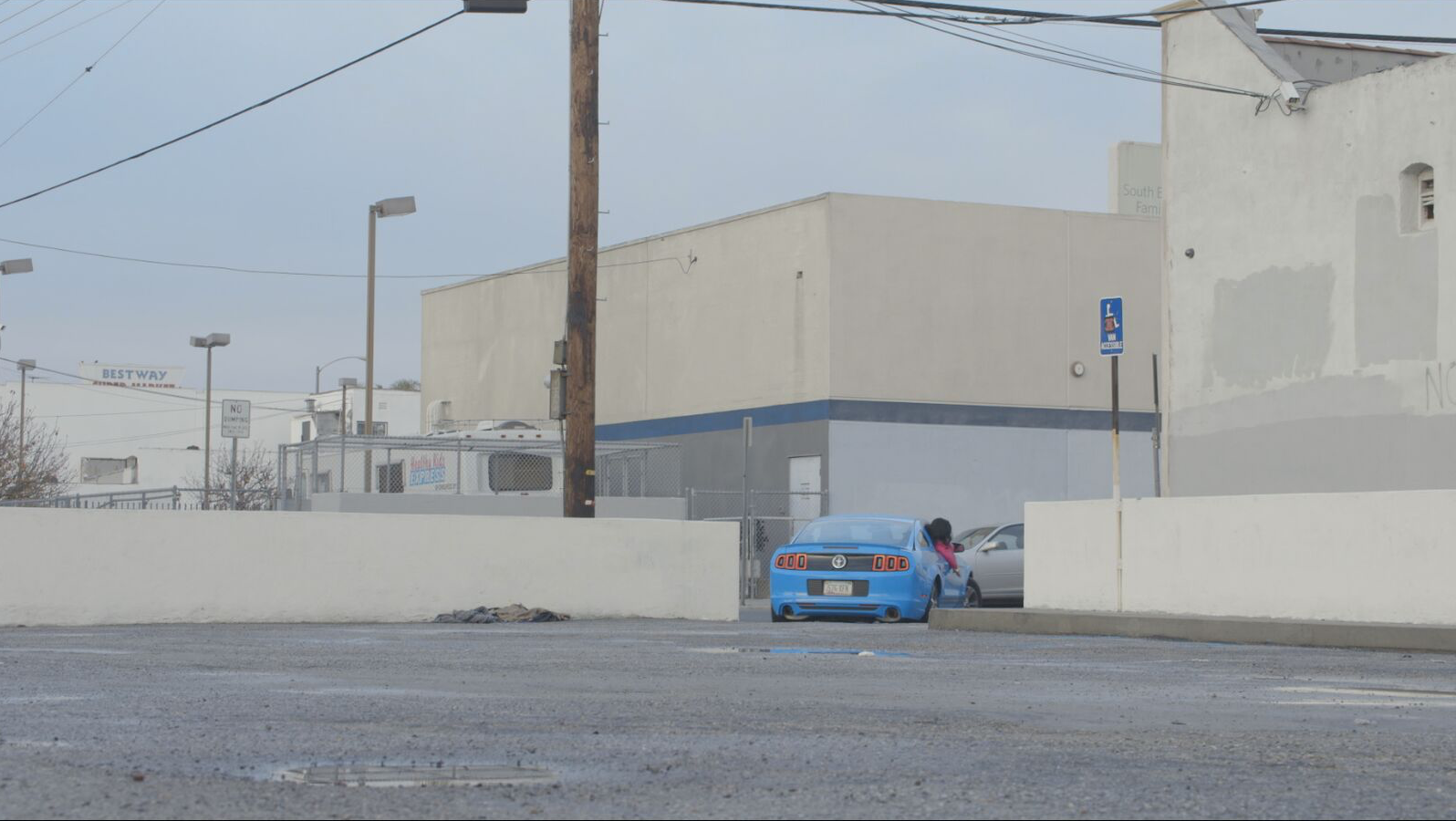
Apollo Insurance
Apollo Insurance is in Highland Park, a Los Angeles neighborhood, which in the last 5-10 years has gone through the predictable ramifications of neoliberal gentrification—all as and more heartless than the architecture of prefab cozy.
Apollo Insurance offers low cost auto and home insurance. Its store front is either: 1. a prospect or 2. an inconvenience to where incumbently now: art students zip to MFA programs in energy cars, coffee-shops serve something called a ‘flat white,’ and families living in houses across three generations are forced out to accommodate web-series writers, Leftist intellectuals, x-Eurozone artists.

Insurance: a means of protection from loss.
Apollo: Cinemas were kept open 24 hours during the 1930s in America. Their constant availability a necessary ration, the light a kind of calm in the darkness of failure. Despair, absolved in the knitted brow of a liar, a platinum blonde. This narcoleptic-delusion-obsession then switched to cars, to highways, to television, and then, to online. Neptune is considered the planet that rules cinema, because it rules dreams. I would like to offer another planet for consideration, and say that the sun (Apollo) rules cinema. Apollo rules light and divination. The celestial body for cinematic light must be ultraviolet, hypnotic, harmful, powerful, necessary.
What is the difference between auto insurance and a belief in a god? An additional perk to the usual contract: luck. Power.
Apollo’s sign=blue neon. Neon=new in Greek. Neon=the chemical element with symbol Ne and atomic number 10. Neon arrives sexy, serendipitously, effortlessly through millennia, to eat its own teeth. New Bright. Bright new. The chemical thing that glows, that also means new. Neon.
Blue neon for the throat chakra, blue for the sky, blue for the crown chakra, blue for depression, and blue for the medieval alchemical decision to cast the human body in the same place as heaven—as above so below.
[I want everyone in blue in the film, I later tell my friend Becket, in Delphi, Greece in front of Apollo’s real temple. Benjamin, I say in a state of utter incomprehension, is my favorite! I love him!—the stars are lit, but liquidated: the violent imposition of language and techno-industrial-capitalist-rationality. The mimesis presented by antediluvian star-gazing/divination—an “out”. Or, like for Baudrillard: astrology=lies/seduction, and so an escape from micromanaged overly-determined entrepreneurial Leftist professionals. Because Adorno’s binary read of astrology creates a hole where he falls? So replete, like Charles Manson’s Christ-like generosity/stupidity where the stated goal of propaganda is to persuade, not to communicate clearly.]
Charles Manson: “Paranoia is just a kind of awareness, and awareness is just a form of love.”
I halt before Apollo’s temple in Delphi, and I want to believe he is the opposite of his brother—Dionysus, that crazy loser. But, I can’t: his reason is a joke, and Apollo must have been the real crazy one—tongue laps out-drinking everyone at the fraternity, vomiting over rails till the dawn of three days hence, mashing his rationality in spills, yelling in streamers, cannon-bombing the pool, ghost-riding a nuclear reactor. The rationality of Apollo freebases cocaine and sodomizes his sleeping brother.
Dear Schengen Zone:
Come to California be a freak like me too
Screw your anonymity, loving me is all you need
To feel like I do
During the war, Adorno lives by the Palisades, a wealthy and epic-beautiful part of Los Angeles, up the coast and removed from reality. In exile from the war and whatever lapse of reality is potentially a constant reminder of reality.
And then upon his short return: post-war California flowers, with new religion. Alternative and counter-cultural movements strike against government enthusiasm and Fordism. There is still: the possibility of utopia, and a sprawl of micro-utopias. Communism on par with occultism in its devotion and followers to revolution. The determinism of Marxism, if matched by the determinism of Astrology. Both armed with the fundament of telos, moving forward to precise outcomes: the Age of Aquarius, the Communist state void of alienation—where is it, how is it? Can we make it happen, in a school-bus operated by Disney? Or maybe by burning tires? By hiring our friends. By making Easy Rider. Marx’s fisherman oiling a Harley Davidson Hydra-Glide.
Nancy Reagan
Righter advises politicians, financiers, economists. He advises Nancy, then much later: President Reagan. Financial and astrological advice: broadly similar? Both opaque in their initial foretelling but hardcore in their major (life) effects/events: buy, sell, risk…birth, death, fortune. The opaqueness of Reaganomics partnered with a geocentric system of divination. Violent deregulation, higher taxes for the poor, lower taxes for the wealthy: like dark comets circling a supposed ethos-center of extreme economic growth and minimal inflation.
At a dinner party in Athens in early 2016, instead of defending myself against a charge of crisis-art-tourism, I defend LA and its obsession and affair with magic, astrology, new age, cults. “Well, in the astrology class I attend, they say LA is a reincarnation of Ancient Egypt—so that is like why I guess we all are like into metaphysics.” “But tell me, do you like Scientology?” “I like it all.” My Eurozone crisis-art-tourism pass is sated, I am as eccentric and fascist as the tourists come: beliefs without questions except with recourse to the absurd, answers only half-truths seeped in ignorant denial, everything I do is perfume. I wear Flower by Kenzo.

Life on Mars: Sex Without Threat (I think you’re submissive, Baby)
For Adorno, “the stars mean sex without threat.”
Like all tenets of authoritarian irrationalism: astrology is for those who somehow recognize the three-fold domination of an authoritarian state (on nature, on their body, on others)—but, freeze at this recognition and the impossibility of correcting this domination. To escape domination=“to penetrate by thinking which means discomfort in many directions.” And, a breakaway from an expected behavior—as detailed in Adorno’s reference to Freud’s “Group Psychology and the Analysis of the Ego”—where, the subject redirects a state of paralysis under intolerable dependency into consuming easily digestible information and comforting forms of authority ( ? softcore when you want to be fucked hard, envisioning world apocalypse and anarchy before you imagine a fair and possible/workable social democracy, relying on astrology when what you really want is submissive sex with a daddy, enjoying accelerationism when what you really want is radical social change?, etc. ______________.)
(And then also: the idea/gossip that bad sex=“sex without threat”, whereas good sex=“sex with threat.” I explain this over and over again in the wrong way to my friends. Walking in Alexanderplatz with Becket, underneath the TV Tower, enthused by post-Communist architecture in new fluorescent colors.)
“But, so wait. What without the threat, that is what makes it fun, what makes it good. Who wants sex without threat? Doesn’t everyone want sex with threat? If there is no threat, no power, no friction, no dirt, no love—then, it is like, the kind of fuck that turns your stomach, a fuck that is as bland as eggs cooked too long for nobody.”
The importance of the Unknown is paramount to Adorno’s argument. Astrology—instead of allowing for transcendence, esoteric alterity and mysticism—creates a place where everything is authorized, simplified into gibberish, known, with the comfort of candy-brittle and stale self-knowing.

Love of Power, Hatred of Politics
After the show, I say, “Tie me up.” He says, “Don’t tell me what to do.” And leaves. He returns to the foot of the bed, tears a sheet with his bare hands—white linen in the moonlight slashed into three strips. He binds: my wrists, my ankles, my eyes—in tight knots. I’m in purple lace, fluorescent in the UV light—beneath my blindfold, I’m Day-Glo wet.
During a state of emergency in Brussels in 2015, police and soldiers hold a rumored S&M orgy-party, in a station responsible for the neighborhood Molenbeek, home to several involved in the November ’15 Paris attacks.
My friend L. tells me this story first, that he has seen this before, in moments of crisis or remnants of apocalypse and war, authority acting out power relations on a scale within sight. Strange and also strikingly banal, the image of sobriety and authority exposed as decadence. As the Nazis lose the war, they lock themselves in Schloss Immendorf, power-sex to the background of Klimt’s masterpieces, which they then incinerate. The glamorous gold of Klimt, with those well-chosen colors (black&red) snaked against sweaty pigskin and despot erections. This skeletal level of domination a banality, a boring stone to cross.
In the pit of the crisis (notions of the inalienable rights of man are dismantled in anticipation of refugees, and glossed over to mean the less lustrous and less noble rights of nationhood, bare life rages to the surface and recalls for Agamben the striking context of 1789, of Sade’s Philosophy in the Boudoir—a text that underscores the dramatic part of the serpentine emergency: “the separation between humanitarianism and politics […] the extreme phase of the separation of the rights of man from the rights of the citizen.”
Where this crisis acts as a sliver of the real emergency: how in the West refugees become “a far greater concern than the millions more stranded in their own countries and those throughout the region who are routinely bombed into nothingness.”
It’s an image that is both like, and unlike, her. It dominates the battles.
In her 1970 book Sexual Politics, Kate Millett describes the subordination of women within a “systematic overview of patriarchy as a political institution.” Millett considers how institutionalized power stratifies within sexual relationships—as, “coitus […] serves as a charged microcosm of the variety of attitudes and values to which culture subscribes.” With Jean Genet’s 1955 play The Balcony, the oligarchy firmly stuck while facades superficially flux—Millett underscores how revolution will never succeed as Revolution until patriarchy is dismantled as—until then—the ideology of male supremacy as birthright will continue for forever to fasten a system whereby “oppression will underlie and corrupt all other human relationships as well as every area of thought and experience.”
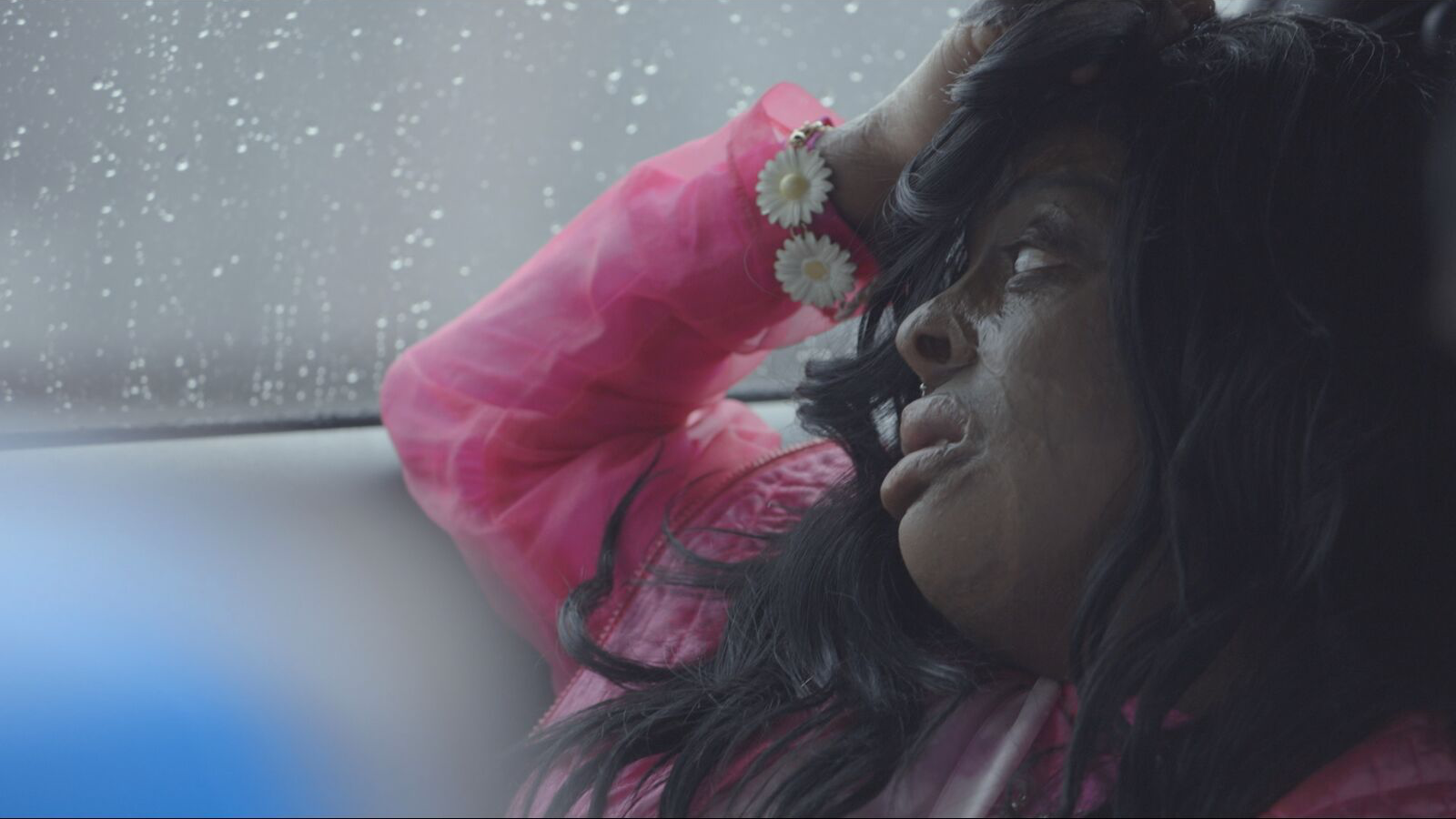
“If only the Brocialists would have listened to Genet and Millett, there could be the possibility of Revolution, instead of a room filled with unnerving manly giggles when the word Vagina is uttered—not pussy—Vagina—the word that still threatens by evoking motherhood, castration, and then the utter denial of testosterone as this necropolitical vomit,” I txt to Anna Maria in 2016.
I’m his secretary
– Adorno blatantly ignores field research and in so doing tartly describes the sex distribution of astrological readership to be predominantly housewife-women suffering from penis-envy & pretending to be CEOs.
(Like: looking at the Facebook groups for astrologer Susan Miller populated with predominantly young female students, but not taking into account the 20 million views of Susan Miller’s exceedingly popular astrologyzone.com and the possible identities hiding behind unknowable IPs. Or, like not considering that astrologer Evangeline Adams’ clients “included the president of Prudential Insurance, two presidents of the New York Stock Exchange, the steel magnate Charles M Schwab, and the banker J.P. Morgan.” Or, like not attending an afternoon group astrology session, where Adorno would have witnessed the male psychoanalysts, economists, and financiers among the mix of low-class women he so imaginatively evokes.)
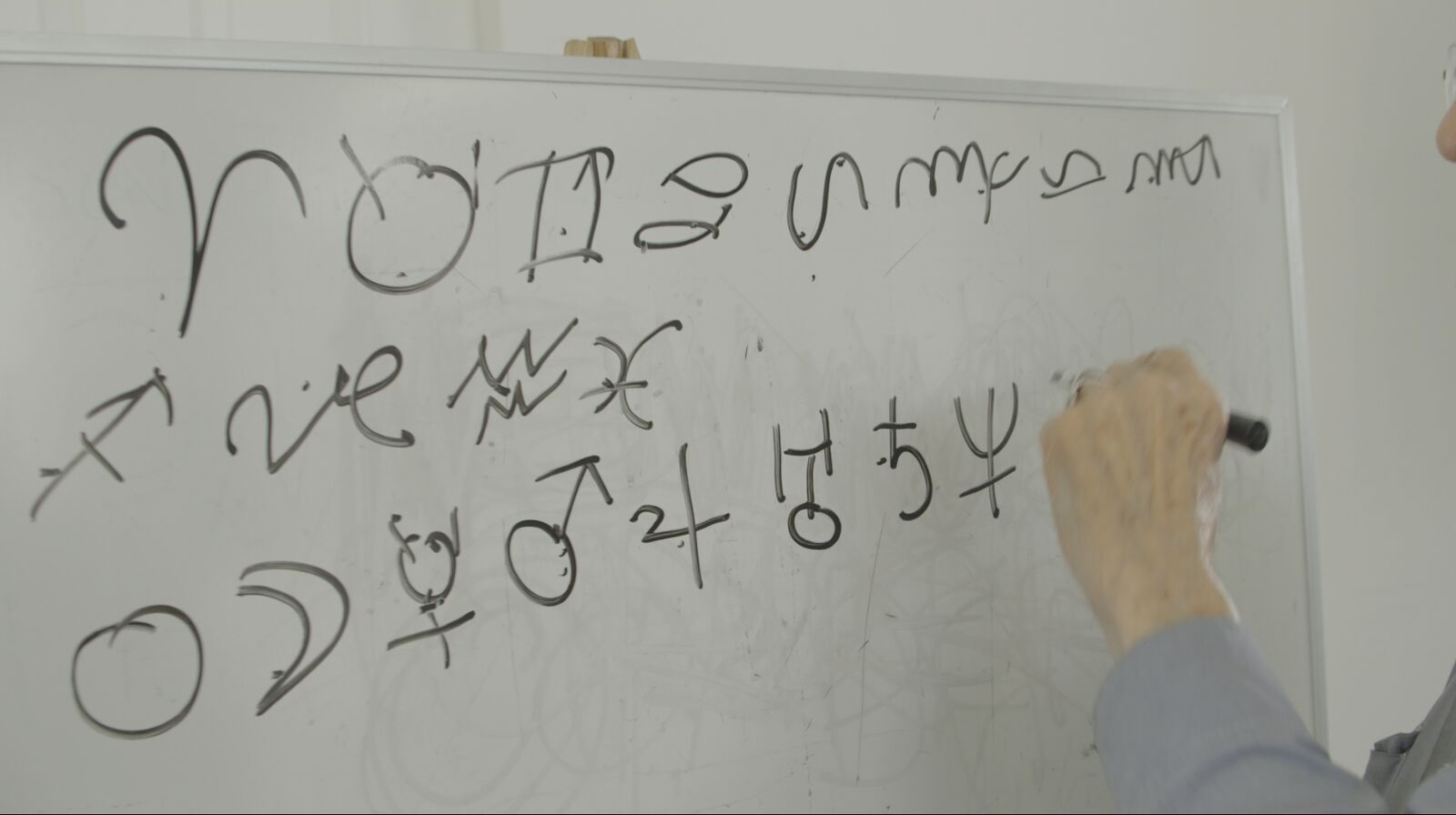
– Adorno ignores the possibility that the stars in instances—possibly—like art, call forth the “feeling of being overwhelmed”—a “similarity once evoked by the term muse.” At least maybe the distinct pink of the Carroll Righter Institute would have taken him outside himself, momentarily, succinctly to this shudder Schauder/Schauer.
– Astrology undoes the fabric of paralysis under domination—a place of alterity to known status quo, radical lost time&purpose to the authoritarian domination of capitalism’s god=useful.
ASTROLOGICAL PREDICTIONS
X37B DRONE=BLACK MOON LILLITH
NOTES FROM JANUARY – MARCH 2016
In the last class I attend in early January 2016, a stoic man explains Bernie will win the presidency. He has the perfect chart for winning, a Virgo with a transiting Jupiter.
I believe him, he predicted Obama’s first and consecutive term.
That Hillary laughs in the face of broadcasted world death or that Trump tweets Mussolini—all of this is presented in conjunction, alongside, the stars. This companionship may be considered as sick as voting within a cloud of propaganda-crush, but it also produces a kind of calm within the opaque and post-political climate (where democracy is superficial and no longer representative but fetishized).
A sick calm to know that: Trump, for instance, will never anticipate the power Saturn will weigh on him come November. But, I do. I know that Trump will contend with the harshest planet, conjunct his sun, squandering his Leo Rising: he will be completely devoured. That Hillary will never be believed—a Scorpio with a packed 12th house. Or that, a Brexit vote under a Mars retrograde, will never come to anything organized—. A sick calm.
From Amsterdam in March 2016, I call my friend Fiona who has moved from New York to Koreatown, Los Angeles. We imagine the possibility that our astrological charts consider satellites and space garbage. If Black Moon Lilith is only a focal point of the moon’s elliptical path (just space), then drone X37B will turn my menstrual cycle like a Scorpio full moon conjunct my natal Jupiter. We draw our charts with Satellite Polar Bear in the same magnetic emphasis as Neptune, a cousin to the watery planet’s betrayals in love and fantasy, a higher exaltation of (the feminine) Venus. At CRAF, we do a Mars birth chart—the geo-centricity of astrology and humanity is totally waning? Despite wishful tech-rev, we complain that the war of the sexes still rages, its subtlety and polite silence even more unnerving, more violent than blatant oppression. “We have only had emancipation for two generations. I ask my father: imagine that the way you think, it is not the only way to think.”
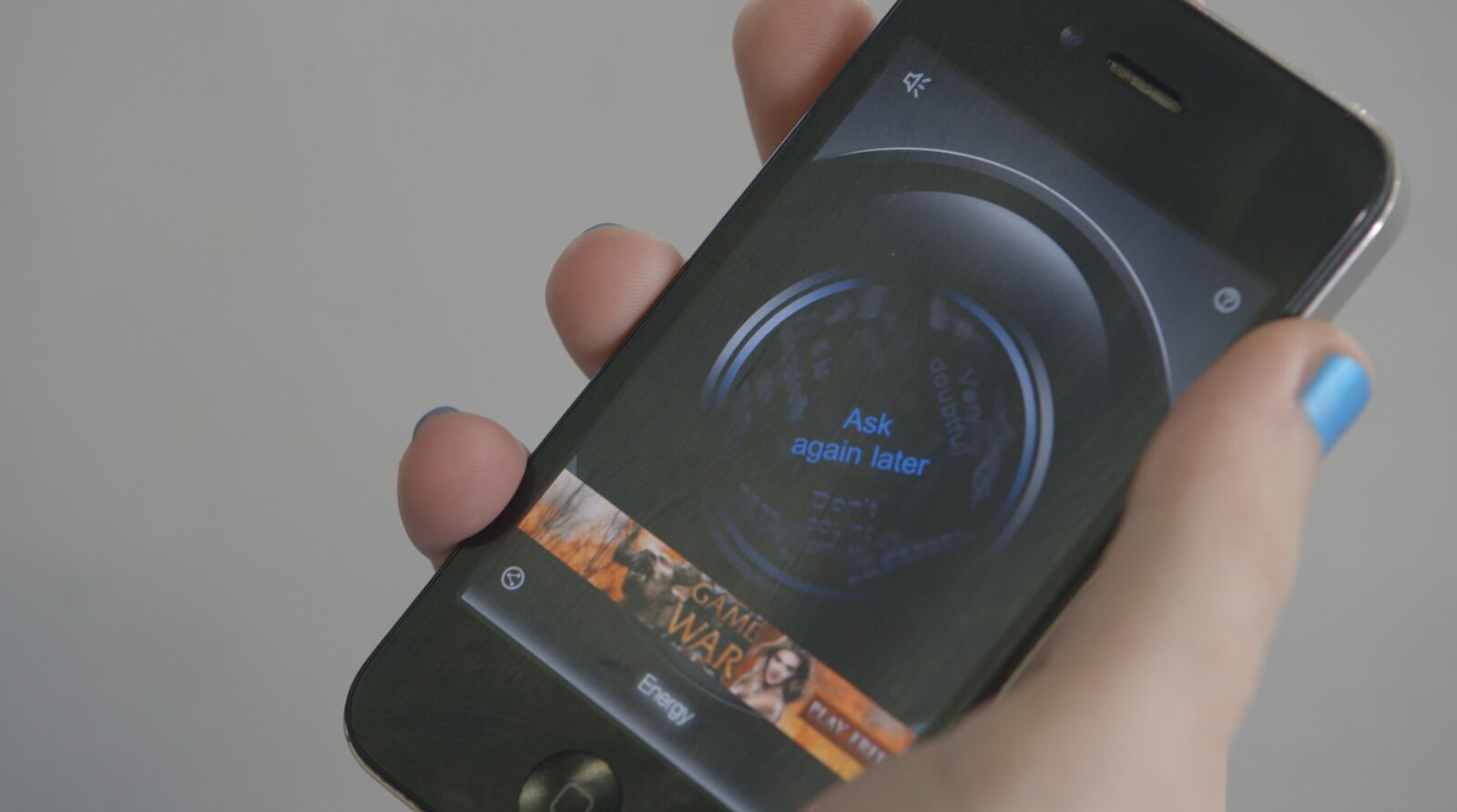
Hope
In 2008, Obama’s campaign is spring-boarded with Hope. A graffiti artist makes a woodcut into a poster done with a form of restraint, not a total endorsement—just a silhouette.
Hope, its etymology is recent, Christian. Threaded through the mind like the rash of shingles, or in German, Gürtelrose—rosebelt, the invisible nerve-endings shaped like roses swell into large inflamed skin lesion-flower tattoos, recurring in the nervous system to underscore a recent relived trauma, tension, or difficulty.
In 2016, I travel with two women to Mount Shasta, which within America sigils Hope, of the New Age. A large crystalline mountain-volcano lords over a village destined to credit card fraud, tourism, and healing. Women arrive here from broken marriages, from abusive relationships, from breast cancer without medical insurance and incompetent doctors, and they find hope. In the workshops on visualization, they find hope. In the extraterrestrial identification workshops, they find hope. In the kabbalah workshops, they find hope. In the possibility that their bodies are like caterpillars—the afterlife, a butterfly—they find hope.
We drive from Los Angeles. We take the 5. The agriculture route, the route belonging to those brave enough to drive boring 2x a week to see their families, the route of idiocy and love.
Hope is beautiful at the gas station
Faith and Hope
Hope at the stall
Serving US
A Kenneth Cole bag
A Camera
A Film she is making
Two motorcycles in her pick up
High on meth
Faith behind the red counter, apologizing for Hope,
In perfect mascara,
Eyes like spiders with sapphire abdomens
We wind the redwoods. Vietnamese Buddhist monk Thich Nhat Hanh’s voice drifts from the radio. From his Plum Village in France his voice lifts into California snow—hope—he says—
And I wonder about Obama, and now Bernie + Hillary + Trump, and if their earbuds on an airplane somehow could transmit the following tape from Thich Nhat Hanh, as if dead-air for 15 seconds could be replaced by Hanh’s voice and an attention-span that approximates faith, as Apollo’s mythic serpents reach drugged politicians, in between their cocktails of Ambien and speed:
Hope can create an obstacle for you, and if you dwell in the energy of hope, you will not bring yourself back entirely into the present moment. If you re-channel those energies into being aware of what is going on in the present moment, you will be able to make a breakthrough.
Hope Love Faith. To use these to persuade for political purposes is a distortion of their code, a bastardization of their purity. Hannah Arendt: “Love, in distinction from friendship, is killed, or rather, extinguished, the moment it is displayed in public. (‘Never seek to tell thy love/ love that never told can be.’) Because of its inherent wordlessness, love can only become false and perverted when it is used for political purposes such as change or the salvation of the world.”
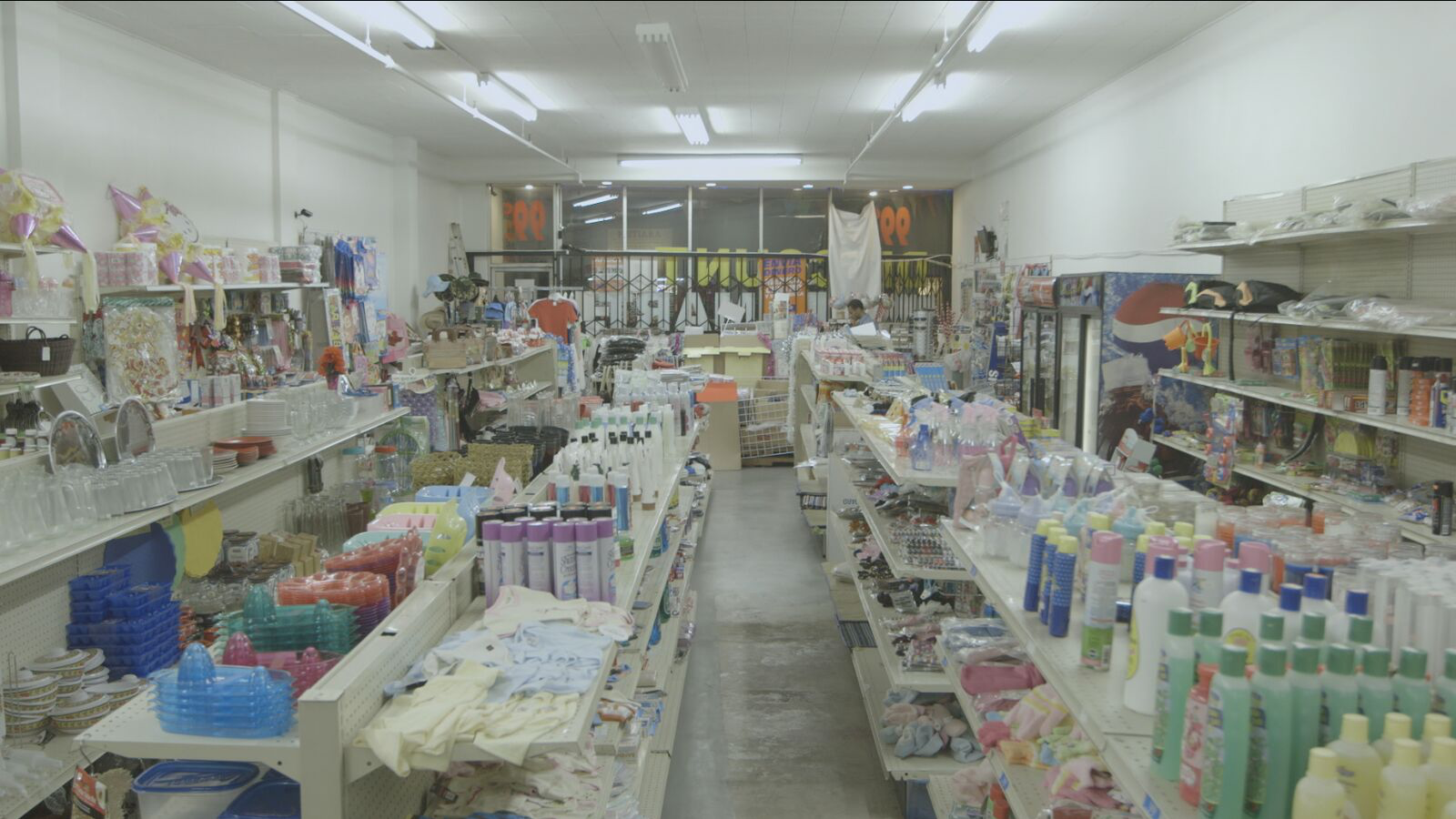
Evil for the Everyday
They tell me I am a rose, and that I have been abused as a child. One woman is told she is a visitor. Not everyone is special. I sit up straight. The chair sinks into the carpet. They are wearing shoes: chunky Nikes. I have been told that healers are supposed to be barefoot. I believe only this. I glimpse their rubber shoes as their hands wave to my root chakra. They are looking at me in disgust. They tell me I have no self-worth. Why don’t I look in the mirror and tell myself I love you.
I eat. I have sex. I go to a gallery dinner. I throw up in the alley.
When I receive my US Social Security card in 2008, the last four digits are the year of another financial crisis: 1929—as if I have won a true fortune, etched in green with laurel leaves recalling the dream of individualism and courage within the polis. A mirror in time: the dirty-thirties to be repeated into the 20 tweens, with asymmetrical warfare on steroids, waged by boys addicted to video games.
I talk to J., who has dyed his hair orange, and now wears gold-rimmed glasses, and a long skirt—an effigy to the Netherlands’ lack of sunsets. He works at the artist residency as hands, and trades online to make his real money. He trades Bitcoin, and other e-coins. He visits London in mid-March. He stays with two friends who trade.
“It trains your mind,” he says, “it trains your mind. You lose a bit of money, and then you freak out. You lose a lot of money and then you don’t freak out. You train yourself in the responsibility of reaction.” Is this then, how politicians are able to talk so obliquely, to talk: lives=$. A trained cognitive state, like losing 500,000 euros in one trading session while on airplane-Wi-Fi to Tokyo. To wake up wide-eyed, ready.
At the art residency in the Netherlands, we sit and eat in lines of 10. Do we invite the refugees here? What about in Sweden, where people have turned refugee accommodation into macabre business models, feeding off government breaks and torturing their guests?
—po-li-ti-cal—a tear on a glass mirror in an Americanized desert war zone.
Rome approaches the airplane like fire. Next to me sits a nun. Her eyeglasses, slim and fixed for a kind of lucidity in the miasma of existence. In the middle of the flight, I wake up—our sleeping faces were paralyzed one second away from a kiss, like a mirror made real-time. I am dressed in black, with fishnets, red lipstick, and dark sunglasses with two gold swerving snakes. We are a movie poster: facing one another, sitting up, asleep, in the sealed aisle.
I meet Alexandra underneath a large Mermaid Fountain. We look the same, blonde women. Later, we listen as Judith Butler outlines the Freudian death drive’s presence within Politics, uninhibited sadism, the relationship of narcissism to guilt and “iconic grieving,” and the mire of interpersonal reciprocity lingering in guilt, a beautiful tragicomedy which still includes caring for the rights of the other.
“Is that us, narcissists?” I ask Alexandra as we leave the lecture in the hot air.
I pace the white apartment with high ceilings. I remember my favorite writer explaining how she wants to change the world. Earlier, in front of Alexandra’s stove, I think: maybe we can change the world. A man reads our tarot cards on the white tiled floor. The sun throws in and out. Shining on this card, then on that card. It shines on the sun card. He explains that we are experiencing a ray of energy unlike any other, the rage and curse of a million mothers.
The Heartz of Men: A Mosquito, Tupac, a Finance Minister
I awake to a heavy mosquito invading my ear. In my sleep, at a small card-table, Tupac sings “Heartz of Men” while the former Greek finance minister sits next to him, his face at 3/4 profile. Tupac tries to tell me everyone is a narc, including the mosquito I will see when I wake, which is really a bug, listening and recording even now, this dream data. Tupac explains the Eurogroup is part of an evil beyond all unveiled evil, and all politicians are narcs to this evil. Tupac then tells me I am a narc as I am also doing nothing.
Keep your mind on your riches, Baby
911
Paola Revenioti
I wait on Valentine’s Day 2016 for Paola Revenioti, an activist and artist—in Exarcheia, the Athenian neighborhood that feels like a city destined for a Paramount sound-stage of anarchy. Except that here: graffiti is used as graffiti—fast. Different than American graffiti, which is subdued into macho-decoration like the immediate post-911 NYC IRAK crew—a micro-utopic art show waiting to happen, nothing more, but also—nothing less.
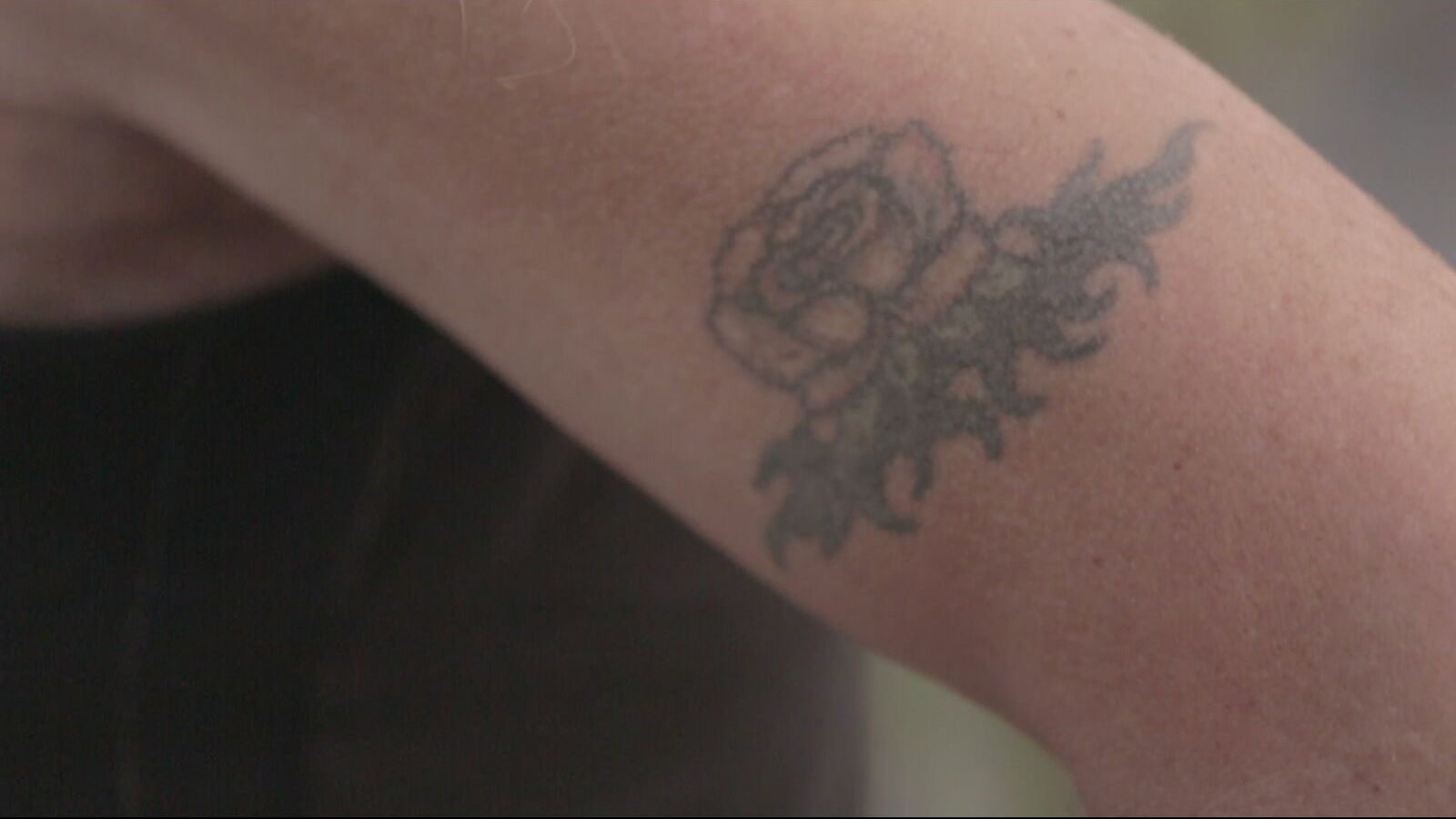
In red ink through a stencil: DOCUMENTA I WILL NOT EXOTICIZE MYSELF FOR YOU.
In pink: 2008 MERRY CRISIS.
I meet Paola through Anna Maria Pinaka:
On Facebook, Paola compares cake to men to Aeschylus. Love without filth and hot/ Love is just a bummer. She posts about her humanitarian work with refugees in Lesbos, part of her documentary film initiative, Paola Project (funded through posts online). Anna Maria explains, Paola is a hero in Athens. She will lend your film credibility. She is mythic. Her pirate radio show, her images first published in her subversive zine, Kraximo, her insistence on being called a prostitute, not a sex worker, holding pride in the possibility of whoredom, her interview in the 1980s with Felix Guattari, organizing Athens’ first Pride in a conservative city in the 1990s as a transwoman, her resistance and activism, and her photographs of friends and lovers which are better than all the American photographers, better than Nan—
As much as everything Paola does is monumental, it is also brazenly non-static and fiercely fluid. In the same way that photography once acted as a field-recording to existence, as dramatic and striking as it is with it—a flow that takes in everything, where “paying attention is the sincerest form of generosity” and so, the most subversive activity.
I meet Paola for the second time in six months with a graduate student from the Athens School of Art, Byron Kalomamas. Byron translates my questions while I stare at Paola. Paola is tired when we meet, she has just arrived from Lesbos, where she is making two films:
P I have a lot of projects in mind. Suddenly I have two documentary-projects lined up that I need to complete this month. I am making one about the refugee crisis, which has been an incredible experience in Lesbos. I drink my coffee at 5:30 pm, by the beautiful sea, and suddenly within ten minutes, I am covered in water up to here and have a baby in my arms.
The other is for VICE, a special case of a person who grew up in a little village and now, imagine, is 60 years old, from the first moment growing up he realized he is different. He said so to his parents and went to Athens. He couldn’t make it there because he was a very sensitive person. He went to the army, he was dismissed, he went back to the village. There his mom, no, both his parents took him to a doctor and they were medicating him so he could become a ‘man’ and they did that for years until he discovered what was going on and started hiding the meds.
B/M And then?
P They got used to him in the village, he wasn’t bullied. Don’t think they didn’t treat him a bit strangely, but once his mother passed he decided to liberate himself.
B/M When his mother died?
P Yes… He felt like a little girl. And two or three years ago, when his mother died, he felt completely liberated and he started ordering—because he doesn’t travel outside his village—from some catalogues, clothes… clothes as such that movie stars wear, and he goes out wearing those.
It was such a difficult subject, no one can approach it—me neither—because he was masquerading. I have a shot of him… it was incredible… he said, ‘when I wake up I comb my hair,’ and then he said, ‘I am going to comb my hair,’ and I walked in the room, and suddenly I saw him in front of the mirror for twenty minutes combing an unexcited head, so this was his way of going into the role of being a woman, and he lived through this role, he couldn’t live it for real. And he is such a sweet person, he talks like a little baby, you cannot imagine his kindness and politeness.
B/M Is it like a portrait?
P No, it depicts the reality of living in Greece in a small fishing island and how a kid—back then when he was 10-12-13 years old, and you must understand he is 60 now—it is about imagining how it was 35-40 years ago, and how now, in his village he is, let’s say, accepted in this society in his way, through his behavior. It isn’t just the case of one person, but the whole of Greek society is revealed through this.
B/M Is this revolution of becoming trans or being your own sexual identity close to a political revolution?
P I cannot see it as a political gesture… you can’t easily make up summaries from such a situation. I can see that he was a very strong person who, in the end, did what he wanted to do, and it was him who drove them mad—he who messed with and turned around their hetero-normativity. He didn’t do it consciously.
Greek society is so complicated—you can’t make sense of it on these matters. In my film Kaliantra, there is a scene where there is a person who lived in the 1950s talking about how they used to go out dressed like women. They were moving like ‘queens’ and stuff like that… We did it to begin with for fun, for a laugh. But, if you scratch the surface you see there is a real person behind it, and this is when human relationships are formed.
B/M What about this film about Auschwitz? What was this idea?
P I imagined it as a visit, I’ll tell you why. Because I see that at least from my generation, when I was 20-25 years old, gay movements had a political consciousness about the pink triangles and about the homosexuals from that era. I am fascinated with how now, no one knows what happened 70 years ago although there are even still survivors living. Secondly, we can see the same phenomena with the refugees, and also in many countries, gays and trans-genders are still treated like minorities, in the same way they used to be treated before post-war Germany. It will be something respectful, it is not going to show corpses for example—just a visit, to remind things that happened recently, 70 years ago. Things that the survivors didn’t talk about ‘til ’67, because they had been in concentration centers. My generation knew about these things, now the new generation knows nothing about fascism and Nazism.
B/M If you look at the same situation in the US, it is partnered with a kind of conservatism.
P It is a matter of liberation. I cannot do otherwise. This is how I grew up. And if you believe that this revolution leads to a true freedom… it also triggers a conservatism at the same time. It is like this thing a French person said to me earlier, “the forest is on fire, and the little bird rushes to bring a drop of water”—everyone does what they can. That’s how art is.
B/M What do you think about the Leftist response to the crisis?
P Unfortunately, we also voted for them, and now we are disappointed.
B/M Are you involved in politics?
P Politics is how you choose to live your life, always.
B/M And about Varoufakis’ response?
P He is just a narcissist, we totally ignore him here, and then they celebrate him there. It’s good that such initiatives take place in an era like this in Greece. But we don’t really care about him here. That’s how Greeks are, one day we praise Socrates, the other day want to kill him, and another to make a statue… But now I am at an age that I have the freedom to say what I want to say and I can politically criticize even those whom I support…
I believe the artist has to always be, whenever, whichever place they have, has got to not be on the side of Power, they have to always be with the weak.
Tell her they have a nice prime minister.
B/M Yes, Trudeau is very cute. In this instance the artist can be on the side of power…
P I agree!
B/M Can you talk a bit more about this idea of artists not siding with power?
P What else is there to say, it is just that… It is unethical for art, for a great artist, to contribute with their art to the suppression of the people, what is this great and amazing cinematographer of Hitler did for example…
B/M Leni Riefenstahl, it’s very strange.
P She was great.
B/M She was an amazing filmmaker, but fucked up.
There is a good question now, last time you told her that your favorite god is Apollo?
P OK, many are my favorite gods, I say these things because you are younger and you don’t know these things, but at your age there was no gay liberation movement, or before me, because I lived this, I went through it. And this was the blessing for Greece: imagine an Anglo-Saxon or a Canadian, they couldn’t stand up ideologically when you’d call them a fag. But here, if someone would call you a fag, you could say ‘oh yeah? Zeus kidnapped Ganymede!’ We had a base—and we had the poet Kavafis.
B/M But Apollo?
P Really I should like more Hermes, because in ancient Greece, the hermaphrodite was the child of Hermes and Venus. Apollo was more the conquering type, he was more horny.
B/M He is more of a babe. And what is your sign?
P Cancer, what’s yours?
B/M Cancer is my favorite, I’m Libra.
P OK.
B/M Do you know the ascending star?
P I’ve never looked into horoscopes. I had a friend, the most famous astrologer in Greece, Lefakis, and I didn’t ask him once.
B/M You didn’t want to know?
P Your fate is constructed by your character, that is what the ancient Geeks said.
I look at Paola. Ten days later, The Nation outlines how the refugees crossing the Mediterranean to Europe have been predominantly handled by volunteers, civilians of Lesbos and ignored by the Greek parliament and EU. In November 2015, Human Rights Watch emergencies director Peter Bouckaert laments how “this is not an insurmountable task. I mean, OK, we’re talking about a maximum of 8,000 people a day, which seems like a huge number, but we handle those kinds of crowds every day at rock concerts, at soccer matches. We do have the capacity to address these people’s needs and to make this journey a lot more humane, but we’re not.”
(Three and a half months later, A. looks at me at Burgermeister in Berlin. His eyes are moving fast, darting from left to right. Thinking before he can talk. “They are shitting in fridges. They are killing and raping those against Erdogan. The refugee camps are locked to outsiders, locked. Basically brainwashing and training camps for militia in Syria. Forget it, if you are a woman.” “Who is behind it? Why would they fund 6bn to Turkey if they know that the camps are like this?” He looks at me like I am stupid.)
The EU response shape-shifts—efficiency, arrest, detention centers, barbed wires at the camp in Lesbos, no barbed wires (for the Pope’s and Angelina’s visits). Threatening the borders with walls, guards and arrests of volunteers, menacing a stronger chokehold for Greece than that of summer 2015. And then, in mid-April, the same day a boat with refugees from Eritrea, Somalia, and Ethiopia capsizes and 500 drown trying to reach Italy, the European Commission announces its first action through the European Support Fund: the immediate release of 83 million in aid to Greece, and in 2016 an estimated 300 million subsequently added to this amount in order “to complement existing efforts through other areas of support,” with 200 million per 2017, 2018. “With funding made available immediately to the UNHCR, the International Federation of the Red Cross and six international NGOs.” The PR rhetoric underscores the utopic solidarity—union.
Critics of the floundering response to the refugee crisis cite the EU’s obligation as signatories to the post-war 1951 Refugee Convention, which makes member states responsible for providing immediate reception and asylum. The post-war legal document shares as context not only the newly merged coal and steel industries of 1951 (and the primary reason for the inception of the EU), but also the imminent possible chasm/threat (fascism, pseudo-rationality, authoritarian irrationalism) relentlessly scrutinized by Adorno in post-war California.
Six Months Earlier in Athens
Paola cupped and rolled the money. She told Nikos she was keeping the money because she wanted to make a film about Auschwitz. Auschwitz, she said, is a perfect way to frame the situation in Greece. She explains that the men of the neo-Nazi party The Golden Dawn live next to her. She is afraid for her life. The men must have erectile dysfunction, she adds, and so they are into Zeus. The bolt, the birth at Crete, an island full of opaque masculinity it makes your eyes hurt, burn, upset. The kind of masculinity that only finds respite in an erased femininity. Paola, like me, is into Apollo.
I ask her to look happier in one shot, and she looks down and then out at the sunset, you mean like I just found a big dick? Her voice is so smooth and perfect: her voice and the sunset at once. Yes, I tell Nikos, yes, tell her to look like she just found a big dick. Paola walks across the frame, triumphant. I just found a big dick! She is maybe repeating to herself. She points at dusk, and traces the horizon line with a ring, victorious. She tells Nikos she feels like Tennessee Williams’ heroine, Blanche Dubois. A half-hour before I had smeared on lipstick, in the mirror. I wanted to look good for her, to look nice.
Cotton
- is a tour guide who blithely resents tourism. Here she is again, in Delphi, explaining the story of an out-of-date God slaying a serpent to a bus-load of tourists who do not comprehend (nor should they under her watch comprehend) the pain of her state, of her neighbors, of the farmers we don’t see, who enter their capital on tractors to protest the impossibility of subsistence on raised taxes and fucked pension reforms. Aluminum, privatized. Cotton, driven elsewhere.
At the back of the bus, a Dutch painter folds large fingers across his chest. He wears a Ramones jacket. Blonde hair cropped, well fed. He is the image of Northern Europe Doing America. In between L. explaining things she does not care about, irrelevance to her homeland, the tourists, an image of the Eurogroup incarnate in enough bodies to make a bus-load—the painter looks out at the landscape, its beauty panting, and laments, “It’s fucked up what we did to Greece, man. It’s totally fucked up. You don’t call your mother when she is old and sick asking her for money. It’s totally fucked up what we did to Greece. Dijsselbloem has Satan on his face.” The bus thunders forward, like a church steeple penetrating a cloud.
Only sheer violence is mute
We look up. The building is a panopticon, a mirrored ceiling like dome. I am tired, but I decide that if I have coffee, I will somehow scream. I have only seen such rooms in films. The iron railing snaking four wings with a square in the middle and a bubble for a guard.
- and I file the west wing, pasting empty bedrooms with photocopied signs that say ‘No Entry’ in black comic sans font—to signal that these men have left. The serendipity is sickening and so goes unmentioned. Before lunch a man helps us paste. His body is lithe, the kind of toughness that only comes in small bodies. The Dutch are favoring Syrians. The men from elsewhere (Eritrea, Ethiopia, Iraq, Libya, Kosovo) are anxious. Their waiting is without thread, and now linked with a possibility of return and intermittent detention centers. He is from Kosovo.
“They took my passport, because I did not have 1000 euros at the border, and so I am now here. Waiting.” “But why leave?” P. looks at me. “It is run by drugs, by cartels, by mafia. I cannot live there.” “Like Juarez?” “Like where? Yes.”
“The government will not save me. They are without sound. No sound, no feeling.” “No song?” “No,” he taps the floor, the desk, “No sound, no feeling.”
Six months earlier in Athens II
The wind is electric. In the square, we have missed the referendum by 5 weeks. Still, when I talk to the cinematographer—he says, “we need to stick together, it could be dangerous”.
The sensationalism in media is the real crisis.
In Delphi, I overhear an American dad tell his son at the theatre something erroneous. In turn, the son tells the father another lie: that Alexander the Great was an orphan. (Alexander the Great was a mama’s boy, like Barthes). Errors and lies, no difference between them, especially within the specific field of assholes.
I email Fiona:
all we need is amy goodman and grass roots – everywhere. abolition of all political parties.
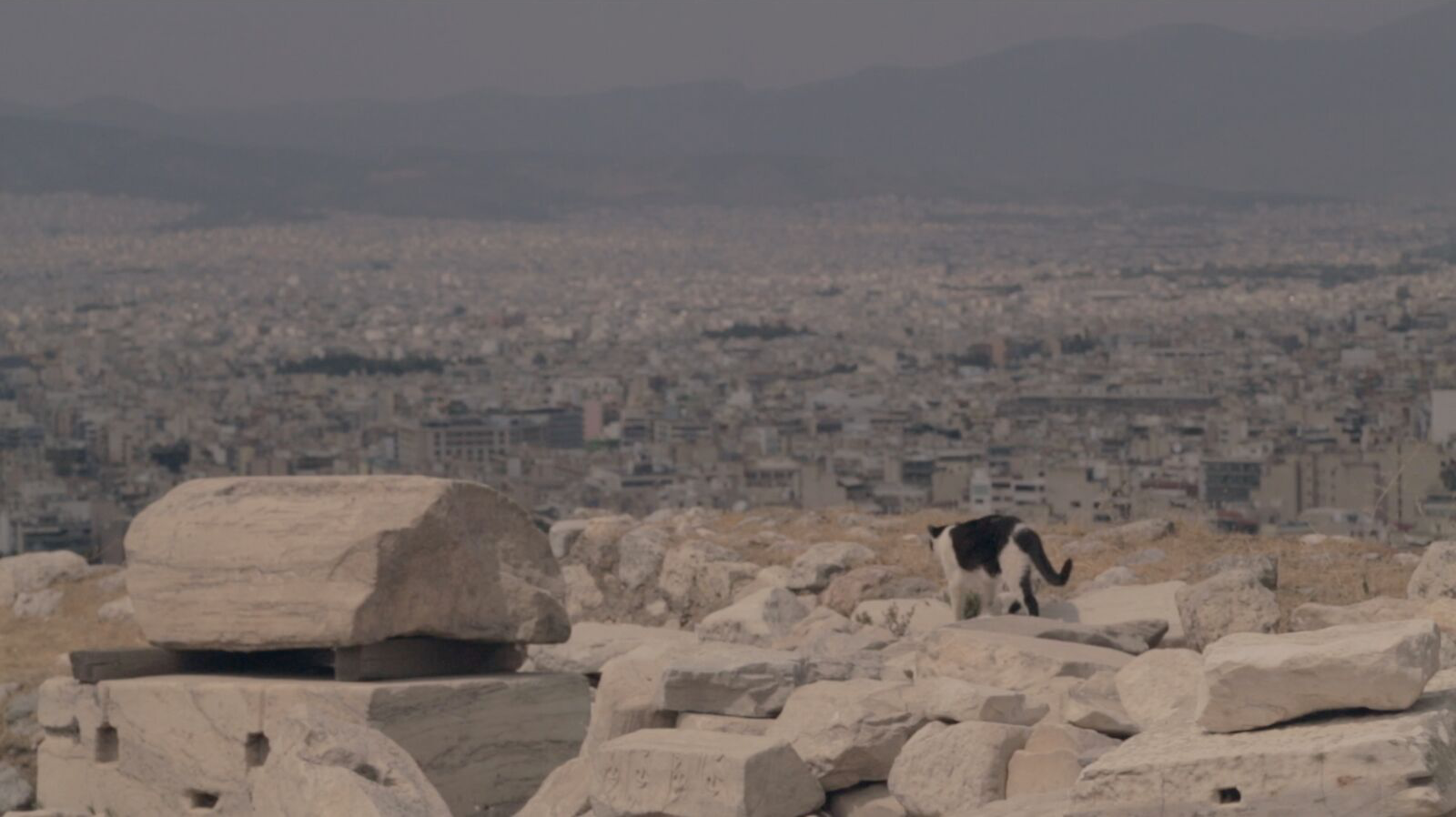
Blue flower, yellow center
In the Oresteia plays, Kassandra is cursed by Apollo. A perverted gift of prophecy bestowing an unknown pain, a visionary prophet never to be believed, instead considered mad, un-soothed and deprived the legacy of acceptance, thrown to forget as she would not succumb to Apollo’s “panting for my love.”
(Close to her foreseen death, she proclaims her refusal of Apollo’s small desire as nothing compared to what she has since suffered: “what seemed shame of old is shame no more.” Within misery, rape is more bearable than its denial.)
Living in multi-temporality (extreme knowing) due to far-reaching cognizance of facts, the ‘whistle-blower’ mirrors “the prophetess of lies, the wandering hag, the pest of every door.” As those who demand transparency (extreme knowing) from power and government are faced not only with the threat of incarceration but worse, like Kassandra—forgetting, erasure, the stinging swing of denial. To punish to forget.

This impregnated forgetfulness of the media smoked with the menace of insanity: Manning fixed as a narcissist, and then—60 Minutes in November 2015 compares her to 2013 Navy Yard shooter—constant strife to disprove an act that was viciously sane.
We’ve heard about your fame in oracles. But here in Argos no one wants a prophet.
Vertigo The Internet As Divination System I
I sleep with a man with white eyelashes, he tells me how strange it must be (for me) to have the body of a man, but the face of a woman, and then he says he means the body of a woman but the face of a man. I dance alone in a rectangle-shaped club to Queen, “Another One Bites the Dust.” I imagine myself as the boy in La Luna. During not-eating, I spend my afternoons milling one Aperol Spritz in front of cold-cut-meat shaped into a butterfly. My friend R. is in Dubai, entertaining a prince. She comes back with a gifted camera and a story about hypnosis in a 120 floor hotel with three men: a doctor, a computer programmer, and the prince. Did they touch you? I don’t know. The hotel, she says, has seven stars. There is only a five-star hotel in Milan. I wonder what allows two more stars, what would make the Bulgari that much better. Its 5 course meals I cannot touch in a gilded gold diner next to Leonardo’s The Last Supper—what would they need to add. R. tells me, an elevator with a tank for sharks. Her hair falls in front of her face like a weapon. The oppressed kinder to the oppressor than the other oppressed. If I am not taught to hate other women here, where before this? was I taught this complicit hatred I did not mean to have to use in life, to have to recognize and stall.
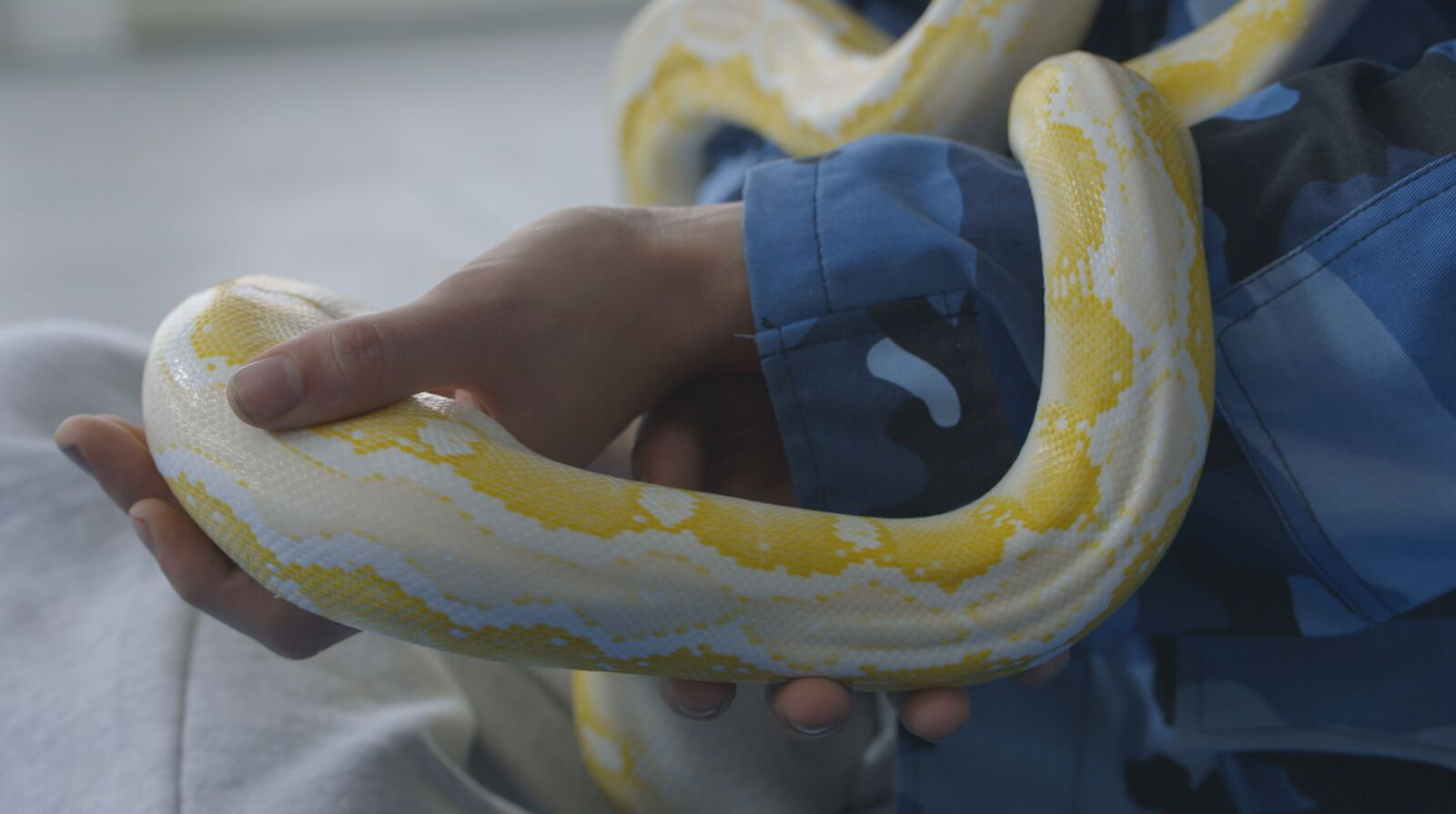
Vertigo The Internet As Divination System II
The Speculative Time Complex: As we live in a world which is no longer fabricated by humans, time shifts from linearity. Amazon decides desire, and algorithms divine from credit and online activity, making the past-present-future of Kassandra’s (or astrology’s) deniers obsolete. We are in her time, hinged on the future, “what happens in the present is a preemption of the future,” as surveillance culture demarcates not only book choices, but polices the possibility of future behavior and in so doing regulates future social / economic / medical / insurance packages for—everyone.
Part of this non-linear temporality is a surveillance culture which trains everyone to be a woman, wittingly or unwittingly behaving for the possibility of a look—as woman was once described in the 20th century as she who “is almost continually accompanied by her own image of herself… the surveyor treats the part which is the surveyed so as to demonstrate to others how her whole self would like to be treated.”
And if: by circumstance of this Surveillance, we are now all women, is the key Irigaray’s mimesis—? What are the techniques of subversion of women living under domination culture—White Supremacist Capitalist Patriarchy—for all the men newly de-facto involuntary women?

The Crisis
In Delphi, I write to Kassandra,
Python snake vapors
Induced the Pyhia to foretell
She was huffing methane gas
From this hole

And then add, “direct quote from tour guide.” Later, Kassandra was high and had a tremendous idea for a tattoo. I try to tell her about a woman in Florida, who walked out into the blistering sun, touched the pavement with her bare hands, ran one acrylic nail over sticky black tar, not knowing that later that day she would shoot a missile, the same missile her neighbors kept, in case of revolution in Florida, which was not strange, considering the history of the magical state, its oranges a decoy for its hedonistic past, replete with angels of eccentric wars. Many people might think you need to be high to shoot a missile into a car. This is actually untrue. I felt crazy when I heard this story, completely run-down and heartbroken, and could imagine that such acts happen inside a mind that is simply tired, annoyed, roughed-up, over-worked. Like spilling milk, or pouring your glass out at the wrong moment, instead you shoot a missile. At nothing. At no one. At air. What is the difference. But, Crystal was arrested.
Crystal Metheny. She tried on several occasions to get the landlord to change the locks on her apartment. She was working nights, and she knew the neighbors next door were stealing whatever she had, which was not much. She could barely tell it was taken, but they were taking something. She had no cash, all her money swept into an account the factory provided. They took a lot off, claimed she had not worked as much, claimed she had taken this, then that, that this was an advance for this, then that. She didn’t argue. She was too tired to argue, and she knew this is what her boss counted on, as he handed her a popsicle on Friday and asked her if she knew how to give a blow job for Sunday. It did not feel like her account, but she spent the money. She spent the money on drugs and cream puff pies, candy bars for dinner, shitty eyeliner. She would arrive home from, not even a waitressing job, a factory job folding towels, tinge, fold, crease, tinge, fold, crease, allow one puncture to the dry towel. Once, she had found a note from the factory in China, it said, why you fuck?, she was not even sure this is what it had said, but she would repeat it to herself as she folded. Crease. Why you fuck? Crease. Why you fuck? Crease. Why you fuck? Why are towels even made like this, the small worms of fabric meant to offer solace, dryness. She would prefer a different cloth to dry her wet skin, run out water beads over with velvet, or even better yet: air dry her pubic hair. She smoothed one hand over the towel. Went home. Found the neighbors snorting her last line. Drinking her last beers. Partying and offering what was hers. Hands reached for her waist. And then, she would hear her favorite glass fall. She would run out into the night. From behind the bushes, she would take the missile she knew the neighbors were keeping for the revolution, or for the apocalypse, or for fun, and she would aim it at her own car.
Later, I read that missile in Florida can also mean rock. I told Kassandra about this, but it was lost on her, instead, from all the cocaine, amused and enlightened at the idea that two bodies could share one tattoo, or maybe it was that one body could share two tattoos. I could not tell from what place the logic was running. I suggested Crystal Beth, because I knew two in California, and wondered what they would think with half their name tattooed on my body. And, actually, I knew three meth heads who were named Crystal. It was the serendipity of generations. Crystal was a popular baby-boom child’s name. And then the meth came, shortly after, for all the Crystals.
